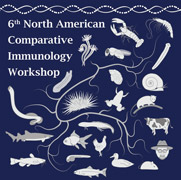Bringing great minds together
By Betty Zou
What do you do when you don’t quite fit in at any of the clubs on campus?
You create your own.
That’s exactly what happened six years ago when Dr. Jonathan Rast and Dr. Brian Dixon, a professor at the University of Waterloo, organized the first North American Comparative Immunology (NACI) Workshop. Rast, a senior scientist in the Odette Cancer Research Program at Sunnybrook Research Institute (SRI), and Dixon were attending an international conference in Prague, Czech Republic, when they and several other Canadian researchers came up with the idea of starting a comparative immunology meeting in Canada. After the first workshop was held at the University of Waterloo, different universities in Canada and the U.S. took turns hosting it. This past June, the NACI Workshop returned to Toronto with over 70 attendees presenting research on 29 different animals.
Comparative immunology blends zoology and immunology to study immune system development and function in animals as diverse as jellyfish, fruit flies and opossums. Immunology has traditionally focused on the mammalian immune system and its role in fending off diseases such as a microbial infection or a malignant tumour. For years Canadian scientists working in comparative immunology would present their findings at immunology or zoology conferences while never really fitting in at either one.
“There was a need for a more specialized venue in Canada,” says Rast. “In the past, immunologists had little interest in what was going on in invertebrates [animals like insects, molluscs and worms].”
Many early scientists dismissed research into invertebrate immunology as uninteresting, because they assumed that the immune systems of these organisms would be simple, boring and of little consequence to human biology.
Were they ever wrong.
As the presentations from this year’s NACI Workshop show, the immune systems in these animals are every bit as elaborate and interesting as those in mammals. While much of the research is focused on building a fundamental understanding of these unique systems, the work has the potential to have an impact on many important areas, including human health, aquaculture and conservation. For example, Dr. Louise Rollins-Smith from Vanderbilt University in Nashville, Tennessee is studying the immune response of frogs to a fungus that is associated with worldwide amphibian population declines.
Rast believes that comparative immunology can also provide important insights into how the immune system develops and functions in humans. He uses the purple sea urchin as a model system to study the complex regulatory networks that govern immune system development and function. “[These organisms] provide an experimentally accessible system to address problems that are inaccessible or extremely expensive to investigate in vertebrates,” says Rast, whose research on comparative genomics has resulted in papers published with collaborators in Nature and Science.
The growth of the NACI Workshop over the past six years—attendance has nearly doubled from the first meeting—speaks to the growing interest in this field and the demand for smaller, less formal meetings. It provides a more intimate environment for participants to network and talk about science and careers.
“People meet at the meeting and they end up working on a project or writing a paper together,” says Dr. Katherine Buckley, a postdoctoral fellow in Rast’s lab and one of the organizers of this year’s workshop. “It’s a good way for people to get to know each other.”
As a postdoctoral fellow, Buckley recognizes the value of meetings like this to foster a sense of community and help connect trainees with potential postdoctoral supervisors or job opportunities.
“We’re basically the only ones [at SRI] who work on this type of comparative immunology,” she says. “If you don’t want your students to feel isolated, and you want them to interact with others [in the same field], the best thing to do is to take them to these meetings.”
To encourage more trainees to participate, the organizers strive to keep the cost of the meetings as low as possible. They also encourage students and postdocs to give talks—at this year’s meeting nearly one-half of the talks were given by trainees. Buckley, who presented a talk, says the feedback she received was very useful since she was able to give a more focused presentation to a specialized audience.
When asked about future plans for the meeting, both Rast and Buckley expressed surprise at its longevity. “Six years ago, I never would’ve thought we would still be doing it in six years,” says Buckley.
Still, they look forward to attending future NACI workshops and reconnecting with friends in the comparative immunology field. “Our colleagues aren’t just at Sunnybrook,” says Rast. “They’re distributed all over the world.”






